Search the Special Collections and Archives Portal
Search Results
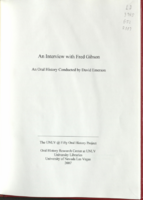
Transcript of interview with Fred Gibson by David Emerson, February 13, 2008
Date
2008-02-13
Archival Collection
Description
Fred Gibson's family came to Nevada in 1929; moving to Ely, Carson City, and eventually Las Vegas. He went into the Army after high school graduation and then studied Japanese at Yale. After some time in Colorado, Fred transferred to UNR and graduated from the Mackay School of Mines. Fred and his dad organized Pacific Engineering and Production Company of Nevada in 1955. The company merged with American Pacific in 1982 and today, among other enterprises, manufactures drugs at a facility in Rancho Cordova. His brother James Gibson served almost 30 years in the Nevada legislature. As a trustee director of the Nevada Development Authority (NDA), Fred was instrumental in organizing support for the idea of an engineering school at UNLV. Fred worked with people like Robert Maxson, Bob Gore, Jack McBride, Bill Flangas, and John Goolsby. He also teamed with Kenny Guinn to elicit donations from individuals and corporations, and lobbied the legislature to garner support for the school. As a member of the University Foundation, Fred has had a lot of interaction with Georgia Tech, and is trying to get the State of Nevada to approve a Georgia plan. He believes this will help the UNLV College of Engineering reach the level of schools like Georgia Tech and MIT. He also encourages the legislature to allow the university to use unclaimed property funds, but this idea still has not met with approval.
Text
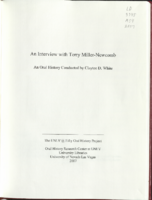
Transcript of interview with Terry Miller-Newcomb by Claytee D. White, October 10, 2005
Date
2005-10-10
Archival Collection
Description
Terry Miller-Newcomb was born at Southern Nevada Memorial Hospital in Las Vegas, Nevada. Her grandparents on both sides were Nevada residents, and her mother and father were born in Reno and McGill, respectively. Her younger sister Linda was born at Sunrise Hospital shortly after it opened. Terry vividly remembers the way Vegas was in the '50s, '60s, and '70s. Las Vegas was very small in the '50s, and one of the town's boundaries was Tropicana Avenue. Beyond that was dirt road and desert. Terry and her sister and friends rode horses out in that area. Terry's father, Chub Drakulich, taught drafting and Phys Ed and coached the basketball team at Rancho High School from 1955 to 1958. Her mother, Theresa Drakulich, was hired at the new Ruby S. Thomas Elementary School to teach kindergarten. Terry attended kindergarten through second grades at Tom Williams, and from third grade on went to Ruby Thomas E.S. Her junior high school years were spent at Orr Middle School, and she attended Valley High School through graduation. "Chub" Drakulich was hired at Southern Nevada University (now UNLV) in 1958 to start the Phys Ed program there. Terry remembers Frazier Hall and the old gym where she played on the gymnastics equipment while her father conducted basketball practice. Her parents would host a party every Christmas as part of the basketball Holiday Classic program. Terry chose to attend UNR after she graduated high school in 1974. She was hired at R&R Advertising in the summer of '78 and worked at the Reno office for two years. She then transferred to the Las Vegas office to work as account executive. She oversaw all advertising for Democrat and Republican campaigns, including road signs, radio and TV spots, and billboards. Between 1984 and 1987 Terry made several major changes in her life. She started a master's program in a totally new area, worked as a church administrator for an income, and was remarried. She finished her master's in 1987 and opened a private practice in marriage and family therapy in 1988, which she continues with today. Her oldest daughter is currently enrolled at UNLV on the Millennium Scholarship.
Text
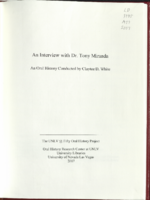
Transcript of interview with Dr. Tony Miranda by Claytee D. White, July 24, 2006
Date
2006-07-24
Archival Collection
Description
Dr. Tony Miranda grew up in Santa Maria and Santa Barbara, California. His father was a chef at the Santa Maria Inn, and the rest of the family spent summers picking strawberries in the surrounding fields. He has a sister who earned a degree in psychology from UCLA, and he credits her voracious early reading habits for inspiring him to continue with his education. Dr. Miranda married and worked as a postman for a while, then began taking night school classes in order to obtain his high school diploma. He liked school so much that he continued at Long Beach City College, then Cal State Long Beach to earn his bachelor's degree. He was offered several fellowships and chose SC on a Teacher Corps fellowship. A friend informed him of an NIMH doctoral fellowship at UCLA, and he chose to take it. In 1976, before he finished the doctoral program, Tony applied for a teaching position at UNLV. He was accepted provisionally, meaning he had to complete his doctoral dissertation in one year. He successfully completed his doctorate and was offered a tenured track position. Dr. Miranda taught Introduction to Chicano Literature for a year, and then took a post-doctoral ethnic studies course at UC Santa Barbara. He returned to UNLV to teach, served as faculty senator, and held the position of chair of the anthropology and ethnic studies department from 1993 until 2004. Today he is revising his book on Hispanics of Southern Nevada and teaching three classes. His second wife has been retired since 1995, having spent 16 years with SIIS. When he retires, they will continue to make Las Vegas their home.
Text
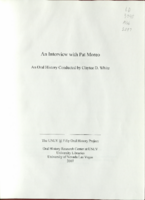
Transcript of interview with Pat Moreo by Claytee D. White, September 13, 2007
Date
2007-09-13
Archival Collection
Description
Pat Moreo was born in the borough of Queens in New York City. His family moved to the Finger Lakes region when he was ten and he finished grade school and high school in Horseheads. He grew up in a close Italian family watching his mother and his grandparents cook both southern and northern Italian dishes. Pat shares his family history, explaining how his maternal grandfather was originally a tunnel builder but quit that trade to open a luncheonette in New York, own and run apartment buildings, and become the first Pepsi Cola distributor in Queens Other family members ran the Pepsi franchise after his grandfather died. Mr. Moreo graduated from New York City Tech in 1967. He worked that summer at various hotels and restaurants and then decided to get his bachelor's degree in hotel and culinary work. He and several friends applied to Oklahoma State and were accepted, but were convinced at the last moment to apply at UNLV. They were accepted as students by Jerry Vallen, the new chair, and arrived in Las Vegas on Labor Day weekend. Coming from New York to Las Vegas in September of 1967 was like landing on Mars Pat describes in detail the heat, the small campus, and the supportive staff at UNLV. People like Jerry Vallen, Boyce Phillips, George Bussel, and Bruce Balton made the newcomers feel welcome, inviting them into their homes and making sure they were comfortable. Pat lived in Tonopah Hall and found work in the student union while working on his degree. After graduation in 1969, Pat went on to work for Harris Kerr Forster and Company (now PKF Consulting) and traveled for them all around California. After a stint in the Naval Reserves, he worked for Howard Johnson Company in NYC, and at the same time completed his master's degree at Cornell University. In 1975 he returned to UNLV as an instructor, earned a PhD in Ed Administration under George Kavina and went on to work at Penn State and New Mexico State. Pat returned to UNLV in 2006 to head the hotel/culinary department and is working with faculty and staff to make revitalizing changes. He expresses his opinions about the importance of food in every culture, explains his position on making people feel welcome, and shares his thoughts on what the future holds for Harrah's College of Hotel Administration.
Text
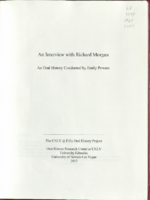
Transcript of interview with Richard Morgan by Emily Powers, November 7, 2006
Date
2006-11-07
Archival Collection
Description
Richard Morgan was born in Fresno, California. His parents moved to the San Francisco Bay area a few months later, where Richard grew up and attended grade school and high school. His father had moved there for the express purpose of giving his children the opportunity to attend U.C. Berkeley. Richard did in fact graduate from Berkeley in 1967 with a degree in political science. After college, Richard married and he and his wife worked for a year to save money to send him to law school. His wife supported him while he studied law at UCLA Law School from 1968 to 1971. After graduation Richard worked for two different law firms, eventually choosing Nausaman and Waters, Scott, Kruger & Reardon. He worked there for 9 years, making partner in 1977. In 1980, Richard left the law firm to teach corporations and commercial law at Arizona State University in Tempe, Arizona. For three years he was an associate professor, and in 1983 was asked to take the position of associate dean. He accepted and held that position for four years. He then became dean at the University of Wyoming College of Law in Laramie, Wyoming. After 2 !/2 years, he was asked to return to ASU as dean of the law school, where he worked for 7 years. In 1997, Richard learned that UNLV was planning to start a law school. Remembering the advice of friends Booker Evans and Willard Pedrick to seize the opportunity to be a founding dean, he applied for the job. He met with Rick Brown, Christine Smith, Mary Berkheiser, and Dianne Retsell to come up with a general strategy for building a law school. Rick became the founding law library director and is currently a professor of law, Christine is associate dean for student affairs and operations, Mary is a clinician and faculty member, and Dianne became Richard's executive assistant. Richard and the other founding members recruited quality faculty members and with Carol Harter's influence, Bill Boyd's support, and aggressive advertising, the law school took shape. They achieved provisional accreditation in 2000 and then full accreditation with the ABA in the summer of '02 after the school moved into its present facility. In January of 2004 the Boyd School of Law joined the Association of American Law Schools. Today UNLV's law school offers a night program, a clinical program, the Saltman Center for conflict resolution, and a lawyering process program. The school is well known in the community and has become the community resource the founding members envisioned it to be. Richard believes the school will continue as it was begun—with an emphasis on excellence and progress.
Text
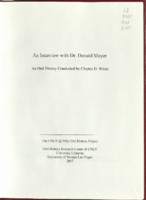
Transcript of interview with Dr. Donald Moyer by Claytee D. White, April 17, 2007
Date
2007-04-17
Archival Collection
Description
Dr. Donald Moyer was born on a farm in Central Illinois. His parents were farmers, but moved to Decatur, Illinois, when Donald was six. Consequently, he went to grade school and high school in Decatur. He then earned a bachelor's degree at the University of Illinois in Champaign, Illinois. His master's and PhD were taken in psychology at the University of Chicago. Dr. Moyer has had a long and illustrious career. After college he helped raise money and students for the University of Chicago and then moved to Portales, New Mexico as director of finance for higher education in the state government. He next served as president of Eastern New Mexico University for five years. From there he came to UNLV in 1965 as chancellor/president, a position he held for 3 years, and worked in marriage and family counseling for almost 30 years right here in Las Vegas. He spent a year in the Los Angeles area doing commercial psychology, and then became vice president at University of Alaska, working there for 7 years. While president, Dr. Moyer focused much of his energy getting regents, community members, and the faculty and student body to recognize the needs of the university. His wife's contributions to this effort were invaluable, as she made their home a warm and inviting place. By bringing these people together into a cohesive unit, monies could be raised to add buildings, staff, and schools that would enhance the quality of education, raise the reputation of the university, and develop UNLV into a leading institution. Much of Dr. Moyer's work during his time as president was "emancipating" UNLV from UNR. This meant creating a faculty senate working only for UNLV, having regents who really represented UNLV, and finding people in the community who would volunteer time and money to carry out the vision of a great university. Today Dr. Moyer and his wife enjoy living in Las Vegas. They stay current on what's happening at UNLV by attending meetings for retired faculty and administrators. Their two daughters have moved to Las Vegas as well, so they have a rich social and family life. He still practices marriage and family counseling, and sees UNLV as a school which will continue to grow in reputation and stature.
Text
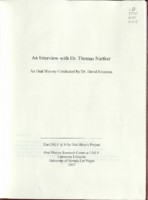
Transcript of interview with Dr. Thomas Nartker by Dr. David Emerson, November 13, 2006
Date
2006-11-13
Archival Collection
Description
Thomas Nartker was born and raised in Dayton, Ohio, and most of his family, including three brothers and a sister, still live there. He attended grade school and high school there, and then attended the University of Dayton. He majored in chemical engineering, following the example of his father, who had a degree in electrical engineering. By the time he was a sophomore in college, he was six-foot nine and had spent some time on the basketball court, but when asked to play his senior year at U. of D., he declined. He had already been accepted for graduate study at the University of Tennessee. Thomas finished all course work and research on his master's in one year, everything but the thesis. He interviewed over 30 companies before he graduated, but an interview with DuPont in Delaware made him think about the value of a PhD in his line of work. He applied and was accepted at Texas A&M. He worked with Dave Billingsley, who was the resident computer expert, and Dave showed him how to process all the data he had collected for his master's thesis on the IBM 650. Tom had found a new passion. Within a year, Tom was working as an assistant in the data processing center at Texas A&M, and was also the teaching assistant for the computer programming class. After completing his PhD, which took 6 years, Thomas began interviewing again. He accepted a position at New Mexico Institute of Mining and Technology (NMIMT) as assistant professor of mathematics and director of the computing center. He left NMIMT in 1981 and took a job with Shell Oil Company, which included 5 years as a visiting staff member at Los Alamos. In 1985 he met John Werth, who ultimately offered Tom a job at UNLV. Tom made the move to Las Vegas in July of 1985. Dr. Nartket and Dr. Taghva started the UNLV Information Science Research Institute and did experimental research on Optical Character Recognition (OCR) for the Department of Energy (DOE). They invented many metrics never seen before, including a metric called Nonstop Word Accuracy. Today UNLV is known worldwide for being the premier center for doing research in OCR technology. Thomas is in his seventies today and continues with his research and teaching because he loves it. He has enjoyed over two decades at UNLV and finds it a rewarding and intellectual place to be. He considers this university to be one of the most exciting in the country as it grows in research and service.
Text
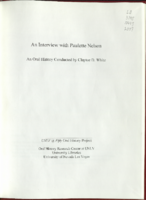
Transcript of interview with Paulette Nelson by Claytee D. White, March 2, 2009
Date
2009-03-02
Archival Collection
Description
Paulette R. Nelson's life in Las Vegas is a contrast of images. She recalls riding her horse across the wide-open desert, as well as embracing the technological changes that rapidly impacted the UNLV library. Paulette honed her life skills as farm girl growing up just south of Mandan, North Dakota. She attended North Dakota State University. A post-graduation summer as a volunteer in Kenya, sparked an interest in adventure and travel and she enlisted for four years in the U.S. Air Force. Rather than enter as an officer, she opted to be enlisted personnel so that she could receive technical training. In 1981, Paulette migrated to Las Vegas, where she had friends at Nellis Air Force Base. She worked at the Nevada Test Site for the next two years. Then, while looking for a new job so that she could pursue an engineering degree, she was offered a position in the UNLV library cataloging department. It was a career path change that she never regretted. She eventually became the Supervisor of the Architecture Studies Library; a position she held for nine years until her retirement Among the highlights of her career was being involved in the change to an electronic catalog system and being on the planning committee for Lied Library.
Text
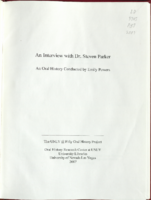
Transcript of interview with Dr. Steven Parker by Emily Powers, December 19, 2006
Date
2006-12-19
Archival Collection
Description
Dr. Steven Parker grew up and went to school in Connecticut. His parents were caterers and taught him a solid work ethic through example. His only sibling was finishing a post doctorate at Yale and had accepted a job at one of the Cal State schools when his life was tragically ended. Steven graduated from Assumption College in Massachusetts with a bachelor's in political science and got a scholarship to State University of New York at Albany. About hallway through his Master of Public Administration degree, the dean encouraged him to go on for his doctorate. He finished his PhD in 1971, and got a job at Western Illinois University which he started on September 15, 1971, the same day his son was born. Alter 8 years (and another child) in Illinois, Steve and his wife were ready to leave. He had attended a public administration conference in Baltimore in the spring of 1975, and was interviewed by Dina Titus and Tom Wright of UNLV. He had several other job offers, but UNLV looked like the best possibility, so he and his family moved to Las Vegas. Dr. Parker's title at UNLV was associate professor and department chair, although Dina Titus actually chaired the department his first semester here. He took over as chair in the spring of 1980. Steven started when Brock Dixon was interim chair, and has served under university presidents Leonard "Pat" Goodall, Bob Maxson, and Carol Harter. Today Dr. Parker teaches American Presidency and American government every semester, Natural Resource Policy and Political Corruption and Political Ethics once or twice a year, and occasionally teaches Urban Government. He also continues as the director of the University Forum Lecture Series, which was initiated by Tom Wright more than 23 years ago.
Text
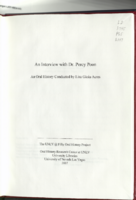
Transcript of interview with Dr. Percy Poon by Lisa Gioia-Acres, February 5, 2007
Date
2007-02-05
Archival Collection
Description
Dr. Percy Poon was born in Hong Kong in 1958, the oldest of four children. He attended Catholic school through junior high and high school, but decided to work after high school instead of going on to college. After working in banking and police forensics for a couple of years, he decided to continue his education. Percy studied economics at a university in Hong Kong, graduated at age 25, and then applied to Southwest Texas State for an MBA. Having earned his degree after only a year and a half, he applied and was accepted to a PhD program at Louisiana State. He interviewed for several jobs as he was approaching graduation, but decided to follow one of his professors, Mel Jameson, to UNLV. In August of 1989, Dr. Poon moved to Las Vegas to take on a visiting professorship, and the next year was promoted to tenure-track assistant professorship. In 1994, he met and married his wife, and they make their home in the southwest valley. Percy recalls the different styles and contributions of university presidents Robert Maxson and Carol Harter. His memories of first arriving in Las Vegas include the marvel of the volcano at the new Mirage Hotel, the oppressive heat, and the smaller size of the city. Currently, Dr. Percy is dean of the College of Business and Finance, and feels that the program is working towards competitiveness with other well-established university programs, such as UCLA or Arizona State. He feels that progress has been made in pushing for academic exams, but that increased funding will create better programs and opportunities. Dr. Poon became a U.S. citizen in 1998, and makes occasional visits to his family still living in Hong Kong. He and his wife socialize occasionally with colleagues and church acquaintances, and also entertain family members when they visit from Hong Kong.
Text
Pagination
Refine my results
Content Type
Creator or Contributor
Subject
Archival Collection
Digital Project
Resource Type
Year
Material Type
Place
Language
Records Classification
